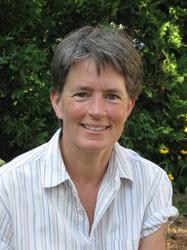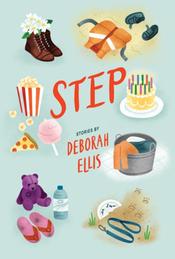 Deborah Ellis is a Canadian author of nearly two dozen books for young people. Step, a collection of 10 stories about the journeys each child takes on their 11th birthday, building confidence and compassion for others, is available now from Groundwood Books.
Deborah Ellis is a Canadian author of nearly two dozen books for young people. Step, a collection of 10 stories about the journeys each child takes on their 11th birthday, building confidence and compassion for others, is available now from Groundwood Books.
On your nightstand now:
The Collected Poems of Audre Lorde: Her writing is so clear and strong and truthful and empowering.
The Norton Anthology of Short Fiction: 90 writers, over 100 stories, so much to learn from.
Albert Camus's Notebooks, 1935-1942: Being able to read his random thoughts, scribbles and parts of stories is wonderful. It's like, "This is what writers do," they scribble down thoughts and some of those thoughts sometimes turn into something readable.
The Island of Sea Women by Lisa See: My wife, Heidy, gave this to me for Christmas. It's about generations of women on the island of Jeju in an all-female diving collective.
Favorite books as a child:
The Teddy Bear Habit by James Lincoln Collier, about a kid who lies to grown-ups and wanders around Manhattan all by himself. I wanted to be that kid. Still do!
A Tree Grows in Brooklyn, Betty Smith's lovely tale of a girl growing into becoming a writer.
Look Through My Window and Kate by Jean Little. Little wrote so beautifully about children grappling with important issues like questions of faith, learning to take responsibility and learning how to be a good friend.
Top five authors:
Jean Little for the dignity in her books for children; Dervla Murphy for her fearless wanderings; Chaim Potok for his deep, quiet entry into new worlds; Kazuo Ishiguro for his lyrical style; and Anne Frank, because she had so much more to say.
Book I've faked reading:
The Red Pony by John Steinbeck. We studied it for ages in the seventh grade. I still don't know what it's about. I recently took it out of the library and tried again, but I still couldn't read it. Sorry, Mr. Steinbeck. I'm sure it's a great book, but it died the death of a boring classroom.
 Book you're an evangelist for:
Book you're an evangelist for:
Shirley Jackson's The Lottery and Other Stories. She has an amazing way of seeing the evil lurking under polite society. I also love her novel We Have Always Lived in the Castle. It's so deliciously creepy, and who hasn't at least sometimes felt that the outside world was out to get them?
Book you've bought for the cover:
Death Is Hard Work by Khaled Khalifa. The cover has a camper van without wheels. This novel is about a journey of some Syrian refugees. There are so many people on the move these days, chased from their homes by war and injustice. We need to know the impact of the bad decisions we allow our governments and corporations to get away with.
Book you hid from your parents:
The Catcher in the Rye by J.D. Salinger. Another kid wandering around Manhattan by himself, with what my parents would have considered a bad attitude.
Book that changed your life:
Knock on Any Door by Willard Motley. I found it among my grandmother's things when we cleaned her house out after she died. I was eight. It's the story of a boy in Chicago who started out as an altar boy and then dies in the electric chair. It's a scathing indictment of the brutality of the juvenile justice system. It opened my eyes to what stories could be about. When I get to the next life, I'll ask my grandmother what she thought of it. She came to Canada from England all on her own when she was young to be a house maid.
Favorite line from a book:
It's from The Book of Lights by Chaim Potok:
"What is of importance is not that there may be nothing. We have always acknowledged that as a possibility. What is important is that if indeed there is nothing, then we should be prepared to make something out of the only thing left to us--ourselves."
I love this line because it says that no matter what we lose, we still have things inside us that we can draw on and give.
Five books you'll never part with:
My Name Is Asher Lev and The Book of Lights by Chaim Potok. Mr. Potok draws us into a world where big questions are struggled with in a way that reminds us we are not alone in the asking.
The Remains of the Day by Kazuo Ishiguro, for the remarkable way he created his main character.
The Plague by Albert Camus. We choose who we are, especially in times of strife.
A Tree Grows in Brooklyn by Betty Smith. I've read it so many times, it feels like coming home.
Book you most want to read again for the first time:
84, Charing Cross Road by Helene Hanff--what a celebration of books, of writers, of letter writing and of unquenchable curiosity!

